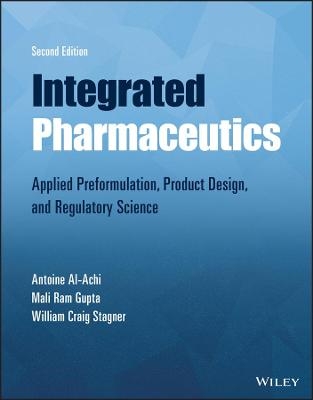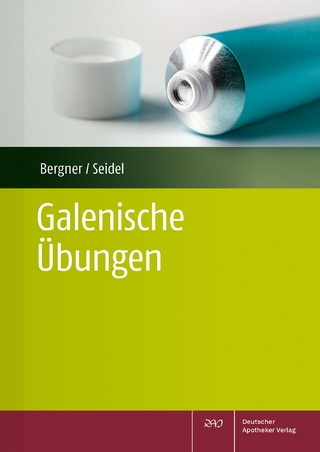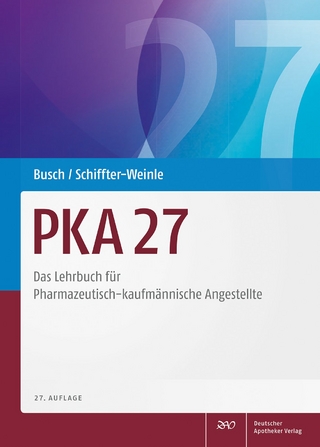
Integrated Pharmaceutics
John Wiley & Sons Inc (Verlag)
978-1-119-57469-9 (ISBN)
- Lieferbar (Termin unbekannt)
- Versandkostenfrei
- Auch auf Rechnung
- Artikel merken
Pharmaceutics refers to the subfield of pharmaceutical sciences that develops drug delivery products or devices to optimize the drug's performance once administered. This multidisciplinary field draws on physical chemistry, organic chemistry, and biophysics to generate and refine these crucial elements of medical care. Moreover, incorporating such disparate dimensions of drug product design as material properties and legal regulation bridges the gap between effective chemicals and viable medical treatments.
Integrated Pharmaceutics provides a comprehensive introduction to the creation and manufacture of effective dosage forms for drug delivery. It presents its subject following the principles of physical pharmacy, product design, and drug regulations. This tripartite structure allows readers to move from theory to practice, beginning from a firm foundation of physical pharmacy principles, including drug solubility and stability estimation, rheology, and interfacial properties. From there, it proceeds to discussions of drug product design and of harmonizing pharmaceutical design with the regulatory regimens and technological standards of the United States, European Union, and Japan.
Readers of the second edition of Integrated Pharmaceutics will also find:
A glossary defining key terms, extensive informative appendices, and a list of references leading to the primary literature in the field for each chapter
Earlier chapters are expanded, with additional new chapters including one entitled “Biotechnology Products”
Supplementary instructor guide with questions and solutions available online for registered professors
Updated regulatory guidelines including quality by design, design space analysis, process analytical technology, polymorphism characterization, blend sample uniformity, and stability protocols
Integrated Pharmaceutics is a useful textbook for graduate students in pharmaceutical sciences, drug formulation and design, and biomedical engineering. In addition, professionals in the pharmaceutical industry, including regulatory bodies, will find it a helpful reference guide.
Antoine Al-Achi, PhD, is a Professor of Pharmaceutical Sciences at the College of Pharmacy & Health Sciences at Campbell University in North Carolina. He is also a former track head of the Industrial Pharmacy graduate major and former Head of the Formulation Development Division of Campbell’s Pharmaceutical Sciences Institute. Mali Ram Gupta, PhD, is an Associate Professor Emeritus of Pharmaceutical Sciences and Director of Pharmaceutical Education & Research (PERC) in the College of Pharmacy & Health Sciences Campbell University. Prior to joining Campbell in 2005, he spent over 25 years managing QA/QC departments of various pharma, cosmetic, and diagnostic companies. William Craig Stagner, PhD, is a Professor Emeritus of Pharmaceutical Sciences at the College of Pharmacy & Health Sciences Campbell University. In his time at Glaxo Research Institute (1987-95), he established the Pharmaceutics Department.
Foreword to Second Edition xv
Foreword to First Edition xvi
Preface to Second Edition xvii
Preface to First Edition xviii
About the Companion Website xx
Part I Applied Preformulation 1
1 Mathematical Concepts 3
1.1 Introduction 3
1.2 Significant Figures and Rounding off Numbers 3
1.3 The Simple Linear Relationship 4
1.4 Exponential Rules 6
1.5 Logarithmic Rules 6
1.6 Differential Equations 7
1.7 Expanding and Reducing Formulas 9
1.8 Weights and Measures 9
References 10
Glossary 10
2 Thermodynamics 11
2.1 Introduction 11
2.2 The Zeroth Law of Thermodynamics 11
2.3 The First Law of Thermodynamics 11
2.4 The Second Law of Thermodynamics 12
2.5 The Third Law of Thermodynamics 13
2.6 Polymorphism 13
2.7 Physical Stability of Crystal Forms 14
2.8 Solubility 14
References 15
Glossary 16
3 Solubility and Dissolution 18
3.1 Introduction 18
3.2 Methods of API Solubility Enhancement 19
3.3 Nonionic, Ionic, and Acid–Base Concepts Related to Solubility and Dissolution 29
3.4 The Solubility of Gas in Liquid 29
3.5 The Solubility of Liquid in Liquid 30
3.6 The Solubility of Solid in Liquid 30
3.7 Disintegration and Dissolution 31
3.8 Concentration Units 34
3.9 The Partition Coefficient 39
3.10 Concluding Remarks 41
References 41
Glossary 44
Appendix 45
4 Biological Aspects of Formulations 46
4.1 Introduction 46
4.2 Bioavailability and Bioequivalence 46
4.3 Protocols for Determining Bioequivalence 48
4.4 Bioequivalence Procedure 49
4.5 FDA-Approved Methods for Bioequivalence Studies 49
4.6 Approaches to Improving Bioavailability 50
References 52
Glossary 53
5 Interfacial Properties 54
5.1 Introduction 54
5.2 Liquid–Solid Interface 54
5.3 Liquid–Liquid Interface 55
5.4 Dosage-Form Applications 55
5.5 Case Study: HLB Determination 58
5.6 Case Study: Determination of Required HLB (rHLB) 58
References 58
Glossary 59
6 Adsorption Phenomenon 60
6.1 Introduction 60
6.2 Adsorption on Filters 66
6.3 Adsorption of Proteins 66
References 66
Glossary 68
7 Rheological Principles 69
7.1 Introduction 69
7.2 Newtonian Systems 69
7.3 Non-Newtonian Systems 70
7.4 Viscoelasticity 72
7.5 Reynolds Number 74
7.6 Concluding Remarks 76
References 76
Glossary 77
8 Chemical Stability and Shelf-Life Determination 78
8.1 Introduction 78
8.2 Shelf-Life Determination 79
8.3 Stability of Biotechnology Products 84
8.4 Compounded Products and Their Beyond-Use Dates 86
References 102
Glossary 107
9 Particle Science 108
9.1 Introduction 108
9.2 Miromeritics 108
9.3 Micronization 113
9.4 Particle Size Preparation and Reduction for Pulmonary Delivery 114
9.5 Polymeric Particulate Matter 115
9.6 Nanoparticles 116
9.7 Segregation of Particles 121
9.8 Case Studies: Microscopic Particle Size Analysis, Determining Statistically Valid Sample Size, and Comparison of Sieve and Focused Beam Reflectance Measurement Chord Length Particle Size Distributions 122
References 126
Glossary 129
10 Basic Statistics and Design of Experimental Concepts 130
10.1 Descriptive Statistics 130
10.2 Inferential Statistics 131
10.3 Statistical Applications in Quality Control Testing 135
10.4 Design of Experiment 136
10.5 Multivariate Analysis (MVA) 140
10.6 Reliability and Validity Assessment 152
References 155
Glossary 155
11 Formulation Development Concepts 157
11.1 Preformulation 157
11.2 Scale-up Considerations 164
11.3 Combination Products 168
11.4 Rate-Controlled Drug Delivery 170
11.5 Drug Delivery Technologies for Improving Oral Delivery 172
11.6 Drug Delivery Technologies for Improving Transmucosal Delivery 173
11.7 Drug Delivery Technologies for Transdermal Delivery 173
11.8 Special Considerations for Biotechnology and Protein Delivery Systems 174
11.9 Drug–Excipient and Excipient–Excipient Interactions 177
11.10 The Presence of Contaminants in a Formulation 178
11.11 Other Considerations 179
References 179
Glossary 184
Part II Product Design 187
12 The Product Design Process 189
12.1 Introduction 189
12.2 Formulation Design 191
12.3 Process Design 194
12.4 Container Closure System Design 195
References 196
Glossary 198
12.A Appendix 199
13 Tablet Product Design 214
13.1 Introduction 214
13.2 Formulation Design 220
13.3 Process Design 225
13.4 Container Closure System Design 249
13.5 Risk Management 255
13.6 Attribute Tests 256
13.7 New Drug Application Stability Assessment 257
References 259
Glossary 264
13.A Appendix 265
14 Capsule Product Design 274
14.1 Introduction 274
14.2 Hard-Shell Capsules 274
14.3 Soft-Shell Capsules 288
14.4 Formulation and Process Optimization 291
14.5 Container Closure System Design 292
14.6 Risk Management 292
14.7 Attribute Tests 292
14.8 New Drug Application Stability Assessment 293
References 293
Glossary 295
14.A Appendix 296
15 Dispersed System Product Design 298
15.1 Introduction 298
15.2 Formulation Design 298
15.3 Process Design 322
15.4 Container Closure System Design 325
15.5 Risk Management 325
15.6 Attribute Tests 326
15.7 New Drug Application Stability Assessment 327
References 328
Glossary 330
Appendices 331
16 Aerosol Product Design 336
16.1 Introduction 336
16.2 Inhalation Formulation Design 338
16.3 Nasal, Buccal, Lingual, and Sublingual Aerosol Formulation Design 351
16.4 Container Closure System Design 354
16.5 Risk Management 356
16.6 Attribute Tests 356
16.7 New Drug Application Stability Assessment 359
References 363
Glossary 366
16.A Appendix 367
17 Sterile Injectable Product Design 369
17.1 Introduction 369
17.2 Formulation Design 370
17.3 Process Design 393
17.4 Container Closure System Design 404
17.5 Risk Management 407
17.6 Attribute Tests 407
17.7 New Drug Application Stability Assessment 408
References 409
Glossary 415
17.A Appendix 416
18 Ophthalmic Product Design 426
18.1 Introduction – Eye Anatomy and Physiology 426
18.2 Formulation Design 429
18.3 Process Design 436
18.4 Container Closure System Design 436
18.5 Attribute Tests 436
18.6 New Drug Application Stability Assessment 436
References 436
Glossary 438
18.A Appendix 438
19 Transdermal Product Design 442
19.1 Introduction – Skin Anatomy and Physiology 442
19.2 Formulation Design 444
19.3 Conclusions 457
References 457
Glossary 459
19.A Appendix 459
20 Oral Modified-Release Product Design 462
20.1 Introduction 462
20.2 FDA and U.S.P. Nomenclature 462
20.3 Modified-Release Mechanisms 464
20.4 In Vitro–In Vivo Correlations (IVIVC) 465
20.5 Coatings 466
20.6 Matrix Systems 467
20.7 Gastroretentive Devices 470
20.8 Osmotic-Controlled Release Systems 470
20.9 Conclusions 471
References 471
Glossary 472
20.A Appendix 473
Part III Regulatory Science 475
21 Regulatory Practices and Guidelines 477
21.1 Worldwide Regulatory Agencies 477
21.2 Good Manufacturing Practice (GMP) 484
21.3 FDA Inspection and Regulatory Actions (FDA 2020b, 2020d) 503
References 510
Glossary 511
21.A Appendix 519
22 Regulations for Compounding Pharmacies 525
22.1 Introduction 525
22.2 Sections 503A and 503B and Their Differences (FDA 2018a) 526
22.3 Compounding Guidelines 526
22.4 Good Compounding Practices (FDA 2007; Skoloff 2009; U.S.P <795> 2020: U.S.P <797> 2020); U.S.P. <1191> 2018; USP29 2006; USP29NF24 2006; OSBP 2017; NDBOPH 2020; NV 2020a; OR 2020; CPE 2017; OK 2020; KY 2016a; WA 2020a; FDA 2020a, 2020b) 527
22.5 Compounding Sterile Preparations (U.S.P. <797> 2020; WA 2020b; CT 2020; OR 2020; NV 2020b; OK 2020; KY 2016b; NYBOP (n.d.); ASPH 2003, 2020; TU n.d.) 532
22.6 Stability Criteria and Beyond-Use Dating of Compounded Non-Sterile Preparations (U.S.P. <797> 2020; WA 2020b; CT 2020; OR 2020; NV 2020b; OK 2020; KY 2016b; NYBOP (n.d.); ASPH 2003, 2020; TU n.d.) 536
22.7 Verification (U.S.P. <795> 2020; U.S.P. <797> 2020; WA 2020a, 2020b) 537
22.8 Patient Counseling (U.S.P. <795> 2020; U.S.P. <797> 2020; WA 2020a, 2020b) 537
22.9 Patient Monitoring and Adverse Events Reporting (U.S.P. <797> 2020; WA 2020b) 537
22.10 Pharmacy Compounding Accreditation 537
22.11 Compounding: Inspections, Recalls, and Other Actions (FDA 2018b; FDA 2018c) 538
References 538
Glossary 540
22.A Appendix 541
23 IND and NDA Phase-Appropriate New Drug Development Process 554
23.1 Introduction 554
23.2 Preclinical Development Overview (FDA 1998) 555
23.3 Phase-Appropriate Clinical Trials Overview (FDA 1998) 556
23.4 Investigational New Drugs 558
23.5 Good Laboratory Practice for Nonclinical Laboratories Studies [21CFR58] (FDA 2020c) 564
23.6 CGMP for Phase 1 Investigational Drugs – Guidance for Industry (FDA 2008) 566
23.7 Good Clinical Practice [E6(R2)] Guidance for Industry (FDA 2016, 2018, 2019a) 568
23.8 NDA Review Process (FDA 1998) 570
References 574
Glossary 575
23.A Appendix 576
24 Biological, Biosimilar, Generic, and OTC Products 584
24.1 Biologicals (FDA 2015a, 2015b, 2016b 2018a, 2018b, 2019a, 2019b, 2019c, 2020a; EMA 2019) 584
24.2 Biosimilars (EMA n.d.-a, n.d.-b; FDA n.d.-a, n.d.-b; Christl n.d.; FDA n.d.-c; Lim n.d., 2013; FDA 2017a, 2017b, 2017c,
2018c, 2020b, 2020c; EMA 2019) 586
24.3 Generic Drugs (FDA 1998a, 2014b, 2017f, 2017g, 2018e, 2018g, 2019d) 588
24.4 Over-the-Counter Drugs (FDA 1998b, 2016a, 2018g, 2019f, 2020e, 2020f, 2020g) 593
References 598
Glossary 600
24.A Appendix 602
25 Accelerated New Drug Approval and Expedited Access of New Therapies 605
25.1 Introduction 605
25.2 Expedited Review and Approval of New Therapies (HIV n.d.; IOM 1991; FDA 2009a, 2010a, 2011b, 2014) 605
25.3 Expanded Access to New Therapies (HIV n.d.; FDA 2009a) 607
25.4 Orphan Drugs (EMA n.d.-a, n.d.-b; WebMD n.d.; FDA 1998a, 2005a, 2018, 2018b, 2020c; IOM 2010) 608
25.5 Pediatric Drugs (FDA 1998b, 2005b) 610
25.6 Pediatric Drug Development and the Orphan Drug Act Incentives (FDA 2010c) 612
25.7 Common EMEA/FDA Application for Orphan Medicinal Product Designation (EMA n.d.-a, n.d.-b;
FDA 2009b; FDA 2018) 612
References 613
Glossary 614
26 Post–Drug Approval Activities 617
26.1 Postmarket Requirements and Commitments (FDA 2016b, 2018f, 2020a, 2020e) 617
26.2 Postapproval Manufacturing Changes (FDA 2018d, 2020b) 618
26.3 Clinical Phase 4 Studies: Postmarketing Surveillance and Risk Assessment (FDA 2018d, 2019b) 619
26.4 Prescription Drug Advertising and Promotional Labeling Direct to Consumers (FDA 1998c) 622
References 623
Glossary 624
26.A Appendix 626
27 Drug Master Files, EU Dossiers, and API GMP Guidance 627
27.1 Drug Master Files (FDA 2001, 2011a, 2011b, 2011c, 2011d, 2011e) 627
27.2 European Marketing Authorization Dossiers 633
27.3 Good Manufactruing Practice (GMP) Guidance for Active Pharmaceutical Ingredients (Q7) (FDA 2016) 636
References 641
Glossary 643
28 Commissioning and Qualification 646
28.1 Regulatory Requirements (Health Canada 2009; EU 2015; FDA 2017, 2018a, 2020) 646
28.2 Preliminary C&Q Activities 647
28.3 Commissioning 649
28.4 Qualification and Validation 651
28.5 Qualification Protocols (ISPE 2001; Health Canada 2009; PIC/S 2018) 653
28.6 Process Validation (FDA 2014, 2019; PIC/S 2018) 657
28.7 Cleaning Validation (Health Canada 2008; FDA 2014, 2017; PIC/S 2018) 659
28.8 Computer Systems Validation (ISPE 2001; EU 2011) 660
28.9 Change Control (EU 2015; PIC/S 2018) 660
28.10 Revalidation (CDRH 1995; EU 2015; FDA 2015; PIC/S 2018) 661
References 661
Glossary 663
29 Quality Systems and Controls 666
29.1 Pharmaceutical Quality System (FDA 2019a) 666
29.2 Quality Systems Approach to CGMP Regulations 669
29.3 Inspection of Pharmaceutical Quality Control Laboratories (FDA 2014) 672
29.4 Pharmacopeias (U.S.P. 2014) 673
29.5 Analytical Instrument Qualification (U.S.P. <1058> 2019a; FDA 2010) 676
29.6 Validation of Analytical Procedures (U.S.P. <1225> 2019b; FDA 2000, 2015, 2019b) 679
29.7 Stability Testing of New Drug Substances and Products (U.S.P. <1150> 2006; ICH 1996; FDA 2018b, 2018c, 2018d) 680
29.8 Electronic Records; Electronic Signatures (Part 11) (FDA 2019) 682
References 684
Glossary 686
29.A Appendix 690
30 Safety, Toxicology, and Pharmacogenomics 696
30.1 Nonclinical Safety Studies (ICH 2009; FDA 2010) 696
30.2 Safety Pharmacology Studies (ICH 2000) 697
30.3 Preclinical Safety Evaluation of Biotechnology-Derived Pharmaceuticals – (FDA 1997; EMA 2011a) 700
30.4 Carcinogenicity Studies of Pharmaceuticals (ICH 1995) 701
30.5 Genotoxicity Testing (ICH 1998, 2008) 702
30.6 Immunotoxicity Studies (ICH 2005b) 704
30.7 Safety Reporting Requirements 705
30.8 Pharmacogenomics (NIGMS 2005; ICH 2005b; ORNL 2010) 706
30.9 Pharmacovigilance (EMA 2011b, 2015, 2021; Eudro n.d.; FDA 2005c, 2005d) 709
30.10 FDA’s Predictive Toxicology Roadmap (FDA 2017, 2020) 711
References 711
Glossary 713
Appendix 716
31 Regulatory Science Initiatives for Advancing Public Health 719
31.1 Introduction 719
31.2 Advancing Regulatory Science for Public Health – A Framework for FDA’s Regulatory Science Initiatives (FDA 2010) 719
31.3 Advancing Regulatory Science at FDA – A Strategic Plan (FDA 2018b, 2018c, 2018d, 2018e, 2018f, 2018g, 2018h, 2018i, 2018j, 2018k, 2018l) 719
31.4 A Collaborative Implementation Framework (FDA 2010, 2011, 2018n) 723
References 724
32 Medical Devices 726
32.1 Introduction (FDA 2018a, 2019a, 2020a) 726
32.2 Device Determination Steps (FDA 2019a, 2020a) 726
32.3 Classification and Regulatory Requirements (FDA 2018b, 2020b) 727
32.4 Current Good Manufacturing Practices (CGMPs) and Quality System Regulation (QSR Regulation) Requirements 729
32.5 Medical Device Complaint Reporting and Recalls (FDA 2019h, 2019i) 731
References 731
Glossary 732
33 Combination Products 735
33.1 Introduction (FDA 2018, 2019e, 2020) 735
33.2 Product Jurisdiction/Assignment of Combination and Non-Combination Products (FDA 2019a, 2020) 736
33.3 Premarket and Marketing Applications (21 CFR Parts 312 and 812) (FDA 2019b, 2019c, 2020) 736
33.4 Current Good Manufacturing Practice – Subpart A (21CFR4) (FDA 2019d) 737
33.5 Postmarkeing Safety Reporting for Combination Products [21CFR4/Part 4 Regulation of Combination Products/Subpart B] (FDA 2019d) 737
References 738
33.A Appendix 739
34 Dietary Supplements 740
34.1 Introduction (FDA 2017a, 2019a, 2019b) 740
34.2 Dietary Ingredients (FDA 2019a, 2019b, 2019c) 740
34.3 Dietary Supplement Ingredient Advisory List (FDA 2019d) 741
34.4 DS Labeling: Claims Types and Requirements (FDA 2017b, 2018, 2019e) 741
34.5 Current Good Manufacturing Practice in Manufacturing, Packaging, Lableing, or Holding Operations for Dietary Supplements (21 CFR Part 111) (FDA 2019f) 741
34.6 FDA Inspection and Regulatory Actions (see – 21.3 FDA Inspection and Regulatory Actions – see Chapter 21 for details) 745
References 745
Glossary 745
34.A Appendix 746
35 Animal Drugs and Devices 751
35.1 FDA Center For Veterinary Medicine (CVM) (FDA 2019a) 751
35.2 Animal Drug Availability Act of 1996 (FDA 2019b) 751
35.3 Development and Approval Process (FDA 2017, 2020a) 752
35.4 CGMP and Others Compliance Requirements 756
35.5 Animal Drug Manufacturing Inspection – Pre-Approval (FDA 2006) 756
35.6 PostMarketing Survellance (FDA 2017, 2019d, 2020a) 756
References 757
Index 759
| Erscheinungsdatum | 29.09.2022 |
|---|---|
| Verlagsort | New York |
| Sprache | englisch |
| Maße | 10 x 10 mm |
| Gewicht | 454 g |
| Themenwelt | Medizin / Pharmazie ► Pflege |
| Medizin / Pharmazie ► Pharmazie ► PTA / PKA | |
| Naturwissenschaften ► Chemie ► Technische Chemie | |
| Technik ► Umwelttechnik / Biotechnologie | |
| ISBN-10 | 1-119-57469-2 / 1119574692 |
| ISBN-13 | 978-1-119-57469-9 / 9781119574699 |
| Zustand | Neuware |
| Informationen gemäß Produktsicherheitsverordnung (GPSR) | |
| Haben Sie eine Frage zum Produkt? |
aus dem Bereich


